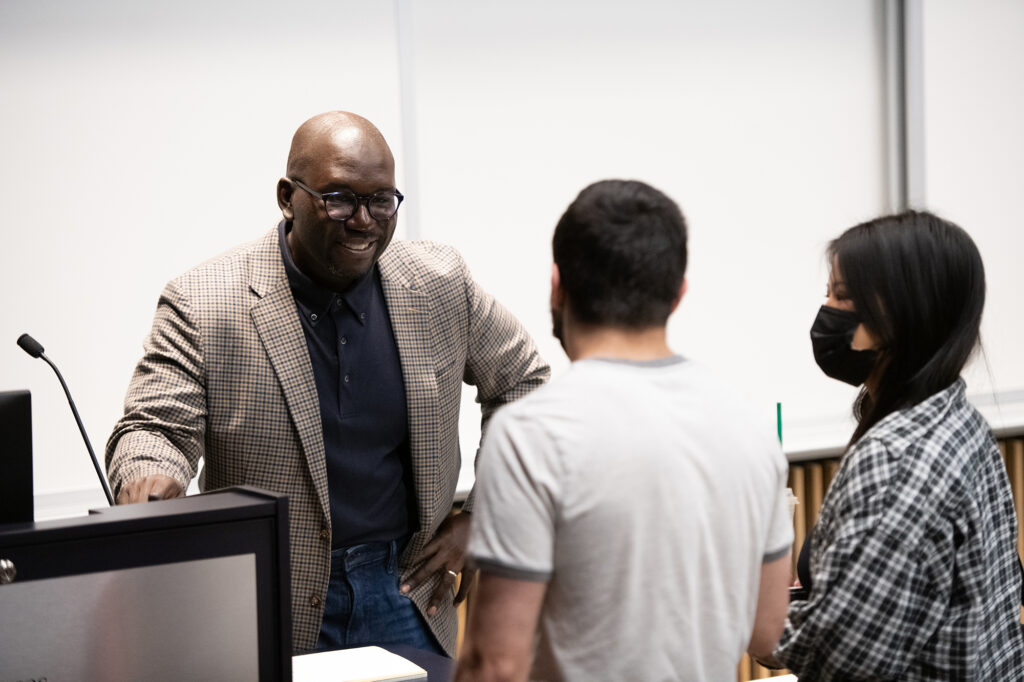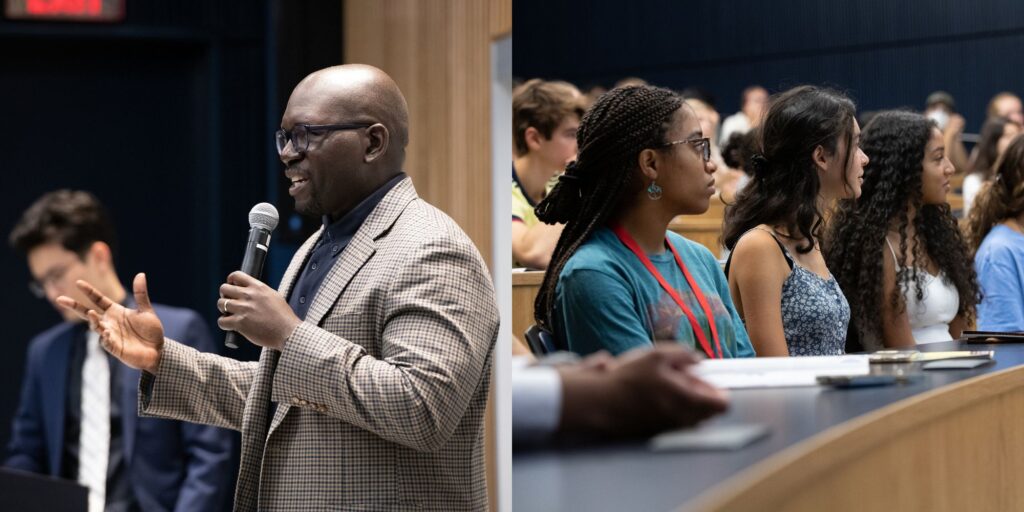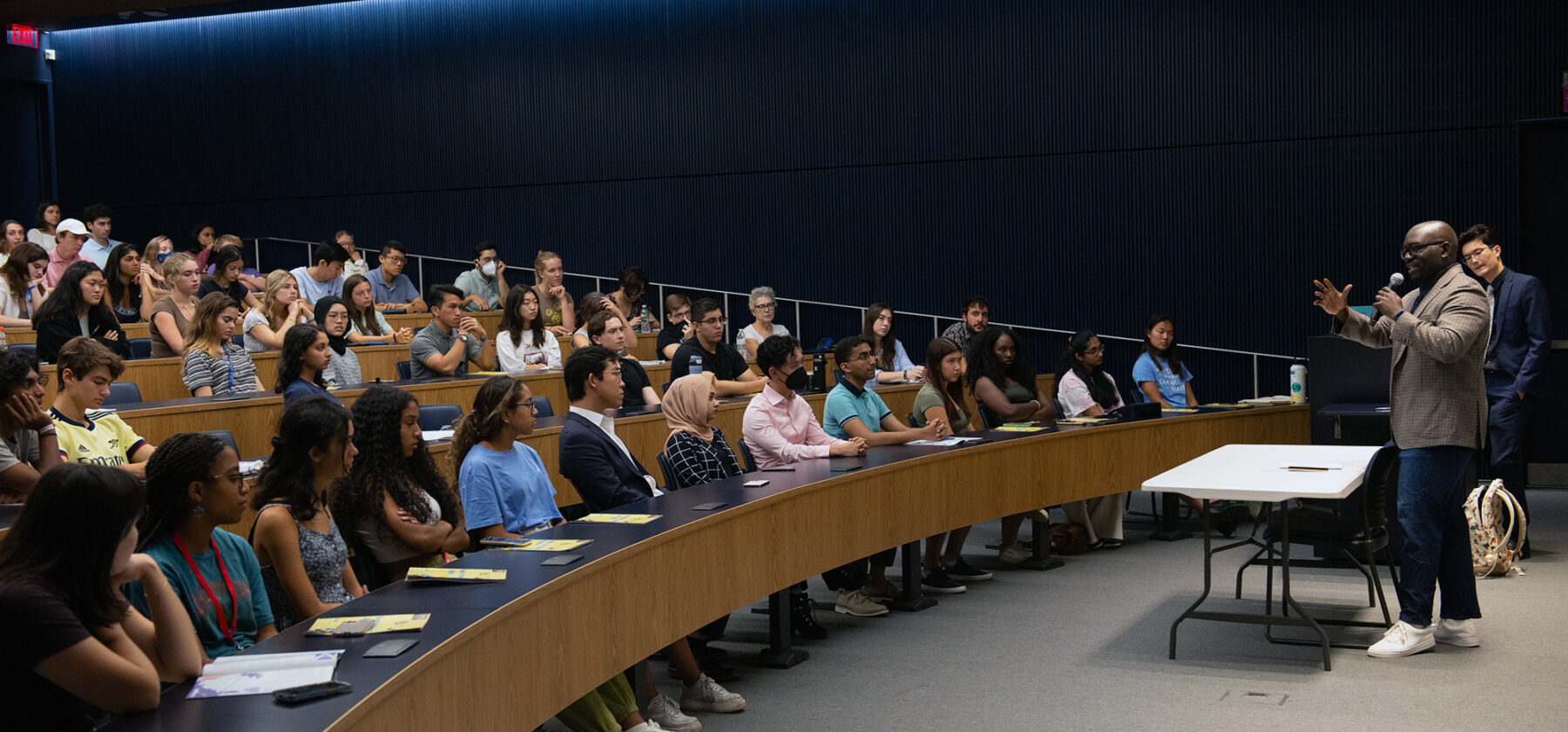Is there a Constitutional crisis of democracy in the United States? According to New York Times columnist Jamelle Bouie, there is a crisis of democracy, but the problem, in part, is the Constitution.
On Saturday, Aug. 27, The Andrea Mitchell Center, The SNF Paideia Program, and The Government and Politics Association welcomed Bouie for a discussion, “Way Past Normal: American Politics in 2022 and Beyond.” Bouie’s columns have explored the anti-democratic features built into American governance, and Penn GPA—the University’s largest political organization, and one that is devoted to nonpartisan dialogue—welcomed Bouie to address the question of democracy in crisis, its origin, and what structural changes he envisions. Introducing Bouie was GPA president Joshua Rose, who addressed the nearly-packed lecture hall in the basement of the Perelman Center for Political Science and Economics on a sunny Saturday.
Bouie welcomed the audience to an exclusive on his latest political ideations, which were prompted by an Aug. 4 meeting between President Joe Biden and a group of experts, historians, and journalists. The group discussed the state of U.S. democracy; their conclusion was it was “not in good shape.” Bouie expanded on that. (“I should have been there,” he added as a comical but truthful aside.)
The tenor of the conversation earlier this month was that U.S. democracy is under assault. Between the Jan. 6 attack on the Capitol, the “Stop the Steal” movement, and everything that followed, there is a real sense that there are acute threats to electoral democracy, and the takeaway was that the Constitution needs protection.

“They are right, and they are wrong,” Bouie said. “They are right that democracy is under attack; what the conversation gets wrong is the assumption that the only thing you have to do to protect U.S. democracy is to protect the Constitution.”
Bouie cited the “shenanigans” at the transition of the Biden presidency that represent a grave notion of threats to self-determination and the mechanisms of electoral democracy that Americans have enjoyed for a long time. “I would like to posit that the Constitution does not need to be protected,” he said. “The Constitution needs to be changed. The threat to U.S. democracy is coming from inside the house. The Constitution itself is the problem.”
Bouie cited Jan. 6 as evidence of this: The bulk of that crisis, he said, was not bad actors trying to overturn mechanisms within the Constitution, but actors trying to weaponize parts of it against democracy. Americans, he said, tend to think of the Constitution and U.S. democracy as one in the same. But, Bouie said, “I don’t think that’s the case.”
He explained that he has done a deep dive into reading about the Founding Fathers, and the origin of the U.S. Constitution. He explained that debates around the ratification of the U.S. Constitution opposed the Constitution entirely—many thought it would curb standards of democracy that emerged after the Revolutionary War.
“You can make a good case that at the beginning of the U.S. as a political entity, democracy is a thing that is bound by the Constitution but not contained by it. A lot of our freedoms predate the Constitution.”
“If you buy the idea that democracy and the Constitution are related but separate, it’s easy to see how the Constitution can act as a threat to U.S. democracy,” Bouie said. “What it has done is encode into our political system everything that was a way to contain American democracy. States had too much power. The Constitution was meant to contain freedoms via the Senate, the electoral college, districts, etc., to diffuse power.”
Bouie cited threats to democracy and crises in the U.S., such as former President Donald Trump, and a climate bill hampered by a Senate that obstructs what the vast majority of Americans want, and argued that “the thing you have to conclude is the basic design of the U.S. Constitution to restrain democratic life, to restrain majoritarian democracy, is working as designed. So, the solution cannot be to strengthen the Constitution, because that would be strengthening the problem. The solution would have to be changing the Constitution.”
“I have all sorts of ideas of how I would revise the Constitution,” he added.
Bouie went on to share some insight into the Founding Fathers who, he implied were problematic (his exact language was “syphilis-ridden slaveholders”). James Madison was thinking in ways that looked hard at institutional design and how to make representation work in a big country. (In an aside, Bouie described Madison as a “weird, sickly little nerd,” with whom he identified in some regard.)
“What I admire most about Madison is his sense of audacity. In 1786, he maneuvered Congress to hold a meeting to discuss an amendment to the Articles of Confederation, which were standing in the way of taxes and commerce. Madison took the lead to hold a meeting. Enough people had shown up to ask Congress to schedule a new meeting to amend the articles—Madison’s idea was to go to Philadelphia in 1787 and not amend Articles, but to rewrite them entirely,” Bouie explained. “That sense of audacity that yes, there is an established system of government, but it doesn’t work: We have to do something different. That is worth taking seriously about the Founding Fathers. The sense that they had agency, they can change things.”
Bouie ended his prepared remarks bluntly. “I’ll say this: I think the United States Constitution needs to change. I think it is threatening democratic assumption and aspirations of Americans to have a genuinely participatory democratic country. The first thing we need to do in pursuing that goal is to take the audacity the Founding Fathers had to change their country. That is what is valuable about the Founders, and what we should seek to emulate today.”
There’s nothing that says a state can’t pass fundamental guarantees of housing, income, or privacy, but they don’t. No state ever has.~New York Times columnist Jamelle Bouie
The first question from audience was an obvious extension of Bouie’s earlier teaser: How would he revise the Constitution? Again, he cited Madison.
“What Madison got right is we can’t have a country as big as what it was even then, there’s too many people, a majority needs to rule. But I don’t think it requires bicameral legislature, or at least one with an upper chamber with as much power as it does, or a Supreme Court with as expansive judicial review as it is, or requires states to have as much influence and authority as it has,” Bouie said. “If I were making the rules, first thing I would do would make the House the primary legislative body. It maintains its current powers but membership would double to keep pace with population and make space for multiple parties. Then I would give the House close to the final word on legislation, and if there must be a Senate, it could be a council of revision. … As it stands, the bicameralism we have gives a lot of power to a very obstructionist and hidebound institution and degrades the quality of lawmaking across the board.”
Lack of responsibility, Bouie continued, makes lawmaking and legislating worse—passing a law means something. “You can see this with legislation around abortion. In places like South Carolina, now that Roe [v. Wade] doesn’t exist, if I pass this law that a 10-year old girl can’t get an abortion if she was raped, some of these [legislators] are like ‘You mean if I pass this law it’s actually going to happen? I don’t know about that.’”
Bouie went on to address the Supreme Court, which he admitted is “complicated”: As long as there is a Constitution there needs to be an institution to interpret it—but he would like to see it as less powerful, having a lot of members that rotate in and out and requiring a supermajority to overrule a law. And states should have less power. He cites the history of states to severely limit freedoms when asked whether he saw value in states as places where smaller governments can try out new legislation.
“I challenge people to look at history to prove that states protect people’s liberty. Find me an example of when that is true—it’s easier to find examples of states abusing their citizens—and I’m saying that as someone who grew up in the Deep South. There ought to be a baseline level of rights that don’t very depending on where you live in this country.”

Bouie explained that no state has ever passed universal basic income, or guaranteed housing, and said they are “not exactly incubators for legislative innovation. The power and influence state governments have over peoples’ lives has been more for ill than good. … There’s nothing that says states can’t provide expansive definitions of personal rights, or expansive definitions of what the state could provide. There’s nothing that says a state can’t pass fundamental guarantees of housing, income, or privacy, but they don’t. No state ever has.”
“States are vulnerable to capture by organized interest, factions, and powerful people. States are not laboratories for democracy, they are opportunities for entrenched interests to capture the mechanism of government and use them as they please.” He cites the amount of power states have to regulate abortion, and compares that power to a police state. ““That to me is a nightmare for freedom,” he added.
The amendment process, Bouie concluded, is inadequate. As an example, he referenced 1865: The country had just fought a war that killed and maimed a huge part of the population to end slavery. The war ended and the country needed to pass an amendment to end slavery. “And even that was hard,” Bouie said. “After mass bloodletting, it was still hard to pass an amendment to the Constitution to finally end slavery. If that bar for amendment is that high, it’s too high.”
Images by Eric Stabach.

